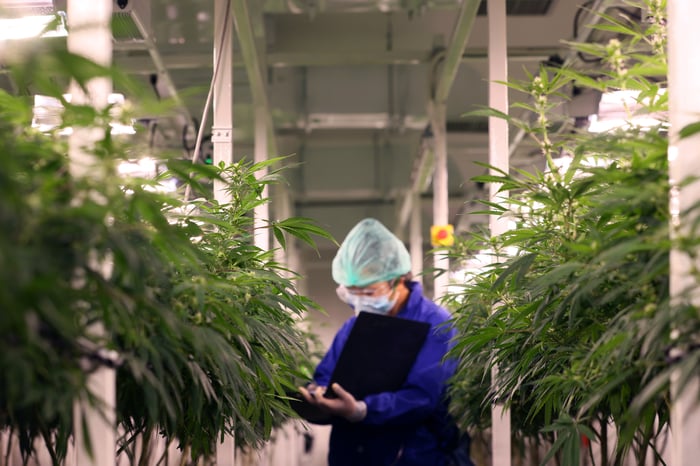Innovative Industrial Properties (IIPR -0.17%) is a highly focused real estate investment trust (REIT). Investors viewed that as a good thing when the marijuana industry it serves was held in high esteem on Wall Street. But a pot sector shakeout has turned this focus into a liability in more ways than one.
Still, even with these headwinds, the REIT looks more than capable of supporting its hefty 8.4% dividend yield. Here's what you need to know.
Marijuana goes in and out of favor
At one point in time, marijuana use was illegal across the United States. And then, in 1996, some laws began to change, opening up an opportunity for companies to build a new, legal, industry. It started with the drug being approved for use strictly for medical purposes in some states, but has since expanded to more states and now includes provisions for recreational use. At this point there are 39 states with legal medical use and 19 where recreational use is allowed.

Image source: Getty Images.
The problem is that marijuana remains illegal at the federal level. That illegality creates a problem for banks, which puts their businesses at risk if they deal financially with a pot-related company. That limits marijuana growers' financing options.
This is where Innovative Industrial Properties comes in. The REIT buys grow houses, and other assets, from marijuana companies and then leases them right back to the seller under long-term net leases. A net lease requires the tenant to pay for most property-level operating costs. Innovative Industrial's tenants use the cash from the sale to finance the expansion of their operations.
It's as close to a win/win as you can probably get, particularly given the restricted access to capital that marijuana companies face. When Wall Street was enthralled with the potential growth story here, Innovative Industrial and pot stocks were flying high. But as with most new industries, too many players jumped into the game, and results didn't live up to expectations. The entire sector crashed, pulling Innovative Industrial down with it.
There are problems at Innovative, but they seem manageable
There's some reason for the pessimism around Innovative Industrial. Clearly, if the company's tenants experience difficult times, there is a risk that the rent won't get paid. That has actually happened but only in a small number of cases. For example, in the second quarter, it collected 98% of its rents, with the 2% coming from a few smaller tenants that were facing financial difficulties.
Here's the thing: Most REITs have tenants that go through hard times. And rent collocation rates often dip below 100%. So from an REIT industry perspective, there's really nothing to see here. In fact, despite this headwind, Innovative Industrial was able to increase its adjusted funds from operations (FFO) by 6% year over year in the second quarter. The adjusted FFO payout ratio was a reasonable 80%. That's not a particularly concerning level for a net-lease REIT.
The company is also doing exactly what you would expect. It is working with tenants to help them where it can, by deferring rent, for example. And, where the problems are too material, it is bringing in new tenants or selling assets. These are REIT 101 moves that every single management team does when it is faced with a similar situation. And given the roughly 80% adjusted FFO payout ratio, there's even room for more adversity before the dividend is likely to be at risk.
IIPR Debt to Equity Ratio data by YCharts
On top of these facts, Innovative Industrial has a very strong balance sheet. For example, its debt-to-equity ratio of roughly 0.15 times is well below that of some of the largest and best-run net-lease REITs. This means that Innovative has room to take on more debt, if it needs to, to muddle through a rough patch. That's an extra layer of protection for the dividend.
Innovative Industrial's dividend looks safe
Clearly, Innovative Industrial is facing the first real challenge in its relatively short public life. But so far it is managing the situation well. There might be more problems before things start to look brighter, but the dividend, based on ample coverage and the company's strong balance sheet, looks likely to survive this tough patch. If you are looking at high-yielding Innovative Industrial, it can clearly still afford its dividend.







